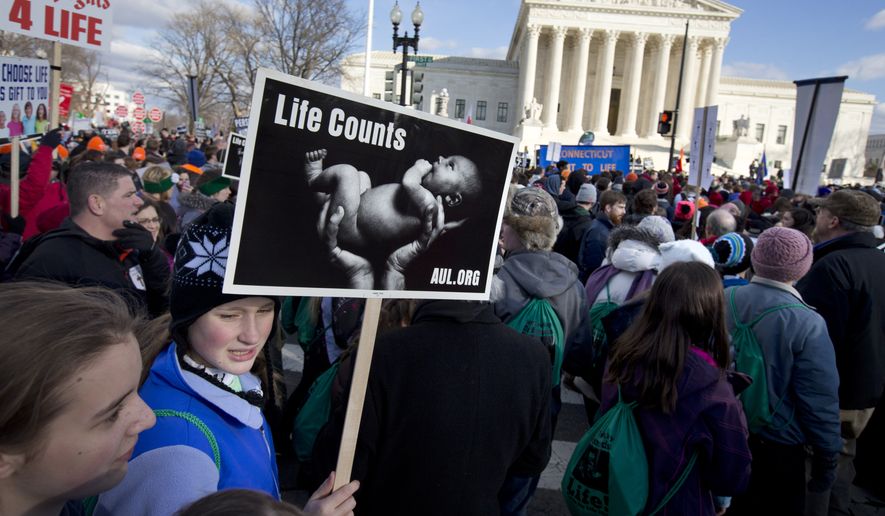The March for Life, the pro-life group that holds a massive rally outside the U.S. Supreme Court every January, does not have to abide by Obamacare’s birth control mandate, a federal judge ruled Monday, saying the organization deserves the same protections as churches.
In a strongly worded opinion, U.S. District Judge Richard J. Leon said the Health and Human Services Department practiced “regulatory favoritism” by exempting houses of worship on grounds its employees are less likely to want the contraceptives, while rejecting pleas from March for Life, a secular group that says its employees don’t want them, either.
“HHS may be correct that this objection is common among religiously-affiliated employers. Where HHS has erred, however, is in assuming that this trait is unique to such organizations. It is not,” wrote Judge Leon, who was appointed to the bench by President George W. Bush.
The ruling breaks new ground in the long-running saga over the contraceptive mandate, an outgrowth of the Affordable Care Act of 2010 that requires employers to cover 20 types of FDA-approved birth control-related drugs and services as part of their health plans.
Pitched as a boon for women’s health, the rules quickly spawned controversy, with dozens of religious nonprofits and devout business owners filing suit, arguing they were being forced to pay for something that violates their core beliefs.
Many Catholic groups objected to all forms of contraception, while evangelical groups and others said they’re only opposed to “morning-after” pills such as Plan B and ella, which they equate with abortion.
SEE ALSO: EPA cracks down on pharmaceutical waste
Previous challenges had chiefly involved faith-based objections and were filed by religiously-affiliated nonprofits, or by family-owned companies. The Obama administration — often with prodding from the courts — devised special rules to try to accommodate those organizations.
The March for Life neither is affiliated with a particular religion nor is a closely-held corporation, but it argued its moral objections are just as strong.
Judge Leon agreed, saying the government should have honored the group’s request.
“March for Life has been excised from the fold because it is not ’religious.’ This is nothing short of regulatory favoritism,” he wrote.
A Justice Department spokesman said the administration will review the opinion.
March for Life was founded in 1973, after the Supreme Court upheld the right to abortion in its Roe v. Wade decision. Every year, the march attracts hundreds of thousands to the National Mall and Capitol Hill to protest the landmark ruling.
The nonprofit, its Catholic president, Jeanne F. Monahan, and an evangelical Protestant employee, Bethany A. Goodman, sued the departments of Health and Human Services, Labor and the Treasury in hope of blocking the mandate, so it could provide health plans that do not include the objectionable contraceptives.
“Pro-life organizations should not be forced into betraying the very values they were established to advance. This is especially true of March for Life, which was founded to uphold life, not to assist in taking it,” said Matt Bowman, senior legal counsel for the Alliance Defending Freedom, which represented March for Life.
In his opinion, Judge Leon concluded that employees are directly affected by the mandate — not just employers — because they are “participants” who pay premiums toward the company plans.
“Given the nature of health insurance, employee plaintiffs do play a role in the health care that plans that prove contraceptive coverage,” he wrote.
The administration has worked out an “accommodation” for religious nonprofits and closely-held corporations. Under the special rules, they are able to notify either their insurers or the federal government that they object to providing contraception, and the insurers or plan administrators would then step in and make sure employees can get contraception without the charity or corporation having to pay for it.
Actual houses of worship, meanwhile, have an even bigger opt-out, which allows them to offer health plans that do not cover the contraceptives outlined in guidelines issued after the 2010 passage of Obamacare.
Judge Leon said the March for Life should get that kind of treatment, citing the Religious Freedom Restoration Act of 1993 that checked the federal government’s ability to pass laws that infringe on religious beliefs, and equal treatment under the Fifth Amendment.
Brigitte Amiri, a senior staff attorney at the American Civil Liberties Union, which supports the contraceptive mandate, said Judge Leon’s decision was “an overreach in many regards” and at most should have adhered to the same accommodation as religious nonprofits.
“Hopefully, the appeals court will correct these errors,” she said.
Meanwhile, many religious nonprofits have rejected the compromise, saying that the notification alone makes them complicit in sin. They have been unable to convince several federal appeals courts of their case, however. They are seeking Supreme Court review.
• Tom Howell Jr. can be reached at thowell@washingtontimes.com.




Please read our comment policy before commenting.